Can I visit my boyfriend? My parents? Go fishing or bushwalking? Coronavirus rules in the ACT and South Australia explained
- Written by Michael Lund, Commissioning Editor, The Conversation
Editor’s note: this article adds to the information we already published for New South Wales, Queensland and Victoria, and we will endeavour to update with information as we are able to collect it.
What you can and can’t do under the coronavirus restrictions seem to vary from place to place so no wonder people have turned to Google for answers.
According to Google Trends, some of the top coronavirus searches nationally in the last few days include “can I visit my parents coronavirus Australia?”, “can I go fishing during coronavirus?” and “can I go for a drive during coronavirus Australia?”
“Can I visit my boyfriend during coronavirus Australia?” was also a common one.
This time we asked legal experts – Benedict Sheehy in the Australian Capital Territory and Mark Giancaspro in South Australia – to help shed some light on what the new rules might mean for residents of their state or territory.
Obviously things are changing quickly so best to keep an eye on the latest information from the ACT and South Australia, as well as the federal government.
Can I visit my parents?
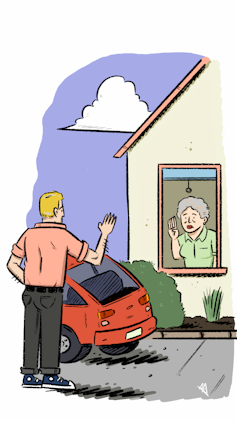 Wes Mountain/The Conversation, CC BY-ND
Benedict Sheehy, ACT: The ACT government is rolling over a set of declarations and there are day by day changes. That is what you might hope for with a small population and a government that is seeking to be flexible.
The declarations are currently less restrictive than those in New South Wales and Victoria. They include fines of $8,000 for breaches by individuals.
The declarations have the same emphasis on reducing gatherings of more than a few people, through to mandatory closure of “non-essential” venues such as gyms, restaurants and museums in line with the national government.
The declarations are likely to become more restrictive in line with spread of COVID-19 and national government policy. Like other parts of Australia there are uncertainties about specific aspects, particularly how they will be interpreted by the police and ordinary people.
At this stage there aren’t tough restrictions. Visits by children who do not normally live with their parents are permitted for “care and support”, including food delivery and other assistance. Visits by friends are also permitted.
The declarations aim to restrict unnecessary visits rather than provide a comprehensive lockdown of elders living at home. But aged care facilities are restricted.
Mark Giancaspro, SA: The SA government has taken direction from the federal government in advising South Australian residents to stay home unless it is absolutely necessary to go outside. There are fines of $1,000 for people who fail to follow the rules on self-isolating.
“Non-essential” visits include social visits to family and friends. But in SA, gatherings of ten people or fewer are currently permitted provided social distancing rules are adhered to (though a limit of two people per gathering is “encouraged”).
If your parents are in a residential aged care facility then a recent direction from the Chief Executive of SA Health prohibits visitation.
In any event, the federal government advises those aged 70 or over (or 65+ with chronic medical conditions) to avoid contact with others to reduce risk of infection.
An obvious exception, which is regarded as “essential” contact, is where care or support are being provided by the visitor.
Read more:
Can I still go to the dentist? How coronavirus is changing the way we look after our teeth
Can I go fishing or bushwalking?
Wes Mountain/The Conversation, CC BY-ND
Benedict Sheehy, ACT: The ACT government is rolling over a set of declarations and there are day by day changes. That is what you might hope for with a small population and a government that is seeking to be flexible.
The declarations are currently less restrictive than those in New South Wales and Victoria. They include fines of $8,000 for breaches by individuals.
The declarations have the same emphasis on reducing gatherings of more than a few people, through to mandatory closure of “non-essential” venues such as gyms, restaurants and museums in line with the national government.
The declarations are likely to become more restrictive in line with spread of COVID-19 and national government policy. Like other parts of Australia there are uncertainties about specific aspects, particularly how they will be interpreted by the police and ordinary people.
At this stage there aren’t tough restrictions. Visits by children who do not normally live with their parents are permitted for “care and support”, including food delivery and other assistance. Visits by friends are also permitted.
The declarations aim to restrict unnecessary visits rather than provide a comprehensive lockdown of elders living at home. But aged care facilities are restricted.
Mark Giancaspro, SA: The SA government has taken direction from the federal government in advising South Australian residents to stay home unless it is absolutely necessary to go outside. There are fines of $1,000 for people who fail to follow the rules on self-isolating.
“Non-essential” visits include social visits to family and friends. But in SA, gatherings of ten people or fewer are currently permitted provided social distancing rules are adhered to (though a limit of two people per gathering is “encouraged”).
If your parents are in a residential aged care facility then a recent direction from the Chief Executive of SA Health prohibits visitation.
In any event, the federal government advises those aged 70 or over (or 65+ with chronic medical conditions) to avoid contact with others to reduce risk of infection.
An obvious exception, which is regarded as “essential” contact, is where care or support are being provided by the visitor.
Read more:
Can I still go to the dentist? How coronavirus is changing the way we look after our teeth
Can I go fishing or bushwalking?
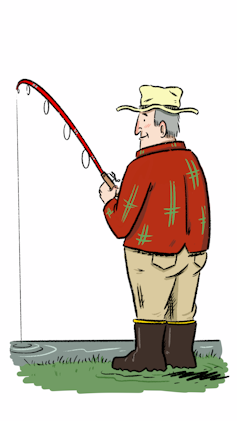 Wes Mountain/The Conversation, CC BY-ND
Benedict Sheehy, ACT: There is no specific restriction but considerable uncertainty. Campgrounds, playgrounds and information centres in Namadgi National Park and the Parks and Gardens facilities are closed.
Most wildlife areas and parks are still open “providing the community access to nature for recreation, health and wellbeing”. The declarations allow non-social outdoor exercise.
As things stand people can apparently go bushwalking or fishing as long as they are not in a closed location (sometimes still closed after the bushfires) and maintain physical distancing 1.5m from others.
Mark Giancaspro, SA: Again, SA is taking advice from the federal government and stipulates that South Australians may leave home for “essentials”, including exercise “in a public space such as a park”, with a limit of two people applying.
South Australians are permitted to visit parks, including bush and walking tracks, provided they have not been ordered to isolate and the parks are in their local neighbourhood. Most South Australian parks remain open to local visitors.
There is no firm direction as to fishing but the federal government said Australians are required to stay home unless it is essential they go outside.
Recreational fishing, therefore, would not be deemed essential. But if this is in the course of employment or to attain seafood for consumption, this would appear to count as an “essential” activity and be allowed (subject to social distancing requirements).
Read more:
Can mosquitoes spread coronavirus?
Can I go for a drive?
Wes Mountain/The Conversation, CC BY-ND
Benedict Sheehy, ACT: There is no specific restriction but considerable uncertainty. Campgrounds, playgrounds and information centres in Namadgi National Park and the Parks and Gardens facilities are closed.
Most wildlife areas and parks are still open “providing the community access to nature for recreation, health and wellbeing”. The declarations allow non-social outdoor exercise.
As things stand people can apparently go bushwalking or fishing as long as they are not in a closed location (sometimes still closed after the bushfires) and maintain physical distancing 1.5m from others.
Mark Giancaspro, SA: Again, SA is taking advice from the federal government and stipulates that South Australians may leave home for “essentials”, including exercise “in a public space such as a park”, with a limit of two people applying.
South Australians are permitted to visit parks, including bush and walking tracks, provided they have not been ordered to isolate and the parks are in their local neighbourhood. Most South Australian parks remain open to local visitors.
There is no firm direction as to fishing but the federal government said Australians are required to stay home unless it is essential they go outside.
Recreational fishing, therefore, would not be deemed essential. But if this is in the course of employment or to attain seafood for consumption, this would appear to count as an “essential” activity and be allowed (subject to social distancing requirements).
Read more:
Can mosquitoes spread coronavirus?
Can I go for a drive?
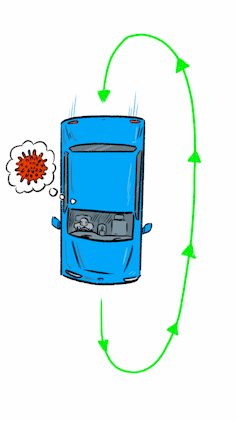 Wes Mountain/The Conversation, CC BY-ND
Benedict Sheehy, ACT: Occupancy in major carparks appears to be down by around 80% . There are no reports of police pulling over motorists with questions about whether travel is essential.
Public transport and taxis are still operating. The expectation is that people will use common sense. Public and private transport will be used for travel to workplaces with an essential status, childcare, for buying food and other supplies, visiting the doctor (queues for flu shots in several locations) and visiting friends.
Mark Giancaspro, SA: Yes, provided this is for the purposes of undertaking an “essential activity”. This includes travelling to: markets for food shopping; public spaces such as parks for exercise; medical facilities or pharmacies for appointments or to collect medications; to work (if you cannot work from home); or to another person’s home to provide them with vital care or support.
It is otherwise required that you stay home and avoid travel.
If you drive beyond the state borders, which is highly discouraged, you may be subject to entry requirements. On return you will also be subject to strict measures including compulsory isolation for 14 days.
Read more:
If coronavirus cases don't grow any faster, our health system will probably cope
Can I visit my boyfriend/girlfriend?
Wes Mountain/The Conversation, CC BY-ND
Benedict Sheehy, ACT: Occupancy in major carparks appears to be down by around 80% . There are no reports of police pulling over motorists with questions about whether travel is essential.
Public transport and taxis are still operating. The expectation is that people will use common sense. Public and private transport will be used for travel to workplaces with an essential status, childcare, for buying food and other supplies, visiting the doctor (queues for flu shots in several locations) and visiting friends.
Mark Giancaspro, SA: Yes, provided this is for the purposes of undertaking an “essential activity”. This includes travelling to: markets for food shopping; public spaces such as parks for exercise; medical facilities or pharmacies for appointments or to collect medications; to work (if you cannot work from home); or to another person’s home to provide them with vital care or support.
It is otherwise required that you stay home and avoid travel.
If you drive beyond the state borders, which is highly discouraged, you may be subject to entry requirements. On return you will also be subject to strict measures including compulsory isolation for 14 days.
Read more:
If coronavirus cases don't grow any faster, our health system will probably cope
Can I visit my boyfriend/girlfriend?
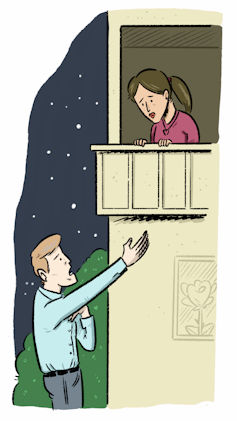 Wes Mountain/The Conversation, CC BY-ND
Benedict Sheehy, ACT: People are still visiting loved ones or friends, subject to restriction on visits by people who are quarantined.
You are not permitted to visit boyfriends/girlfriends if either are subject to any are in self-isolation (people who have been diagnosed as having COVID 19) or self-quarantine (people who are travellers returning to the ACT from an international trip).
Mark Giancaspro, SA: Yes, provided you adhere to the limitation as to gatherings of people, as well as the social distancing requirements.
Read more:
The coronavirus lockdown could test your relationship. Here's how to keep it intact (and even improve it)
Can I go for a walk around my neighbourhood or sit on a park bench?
Wes Mountain/The Conversation, CC BY-ND
Benedict Sheehy, ACT: People are still visiting loved ones or friends, subject to restriction on visits by people who are quarantined.
You are not permitted to visit boyfriends/girlfriends if either are subject to any are in self-isolation (people who have been diagnosed as having COVID 19) or self-quarantine (people who are travellers returning to the ACT from an international trip).
Mark Giancaspro, SA: Yes, provided you adhere to the limitation as to gatherings of people, as well as the social distancing requirements.
Read more:
The coronavirus lockdown could test your relationship. Here's how to keep it intact (and even improve it)
Can I go for a walk around my neighbourhood or sit on a park bench?
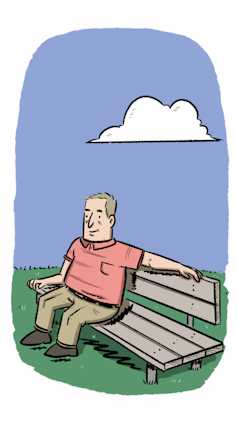 Wes Mountain/The Conversation, CC BY-ND
Benedict Sheehy, ACT: The declarations allow outdoor exercise and walking to the shops. The restriction emphasises physical distancing rather than a curfew or ban on being outdoors.
The declarations contains no specific instruction concerning park benches.
Mark Giancaspro, SA: Yes. In fact, this is recommended if you plan to exercise, as open spaces provide opportunities to stay active and healthy while also abiding by social distance requirements.
This is again subject to limitations on the number of people assembling. You should not go for a walk or sit on a park bench with more than one other person.
Read more:
Coronavirus: tiny moments of pleasure really can help us through this stressful time
Wes Mountain/The Conversation, CC BY-ND
Benedict Sheehy, ACT: The declarations allow outdoor exercise and walking to the shops. The restriction emphasises physical distancing rather than a curfew or ban on being outdoors.
The declarations contains no specific instruction concerning park benches.
Mark Giancaspro, SA: Yes. In fact, this is recommended if you plan to exercise, as open spaces provide opportunities to stay active and healthy while also abiding by social distance requirements.
This is again subject to limitations on the number of people assembling. You should not go for a walk or sit on a park bench with more than one other person.
Read more:
Coronavirus: tiny moments of pleasure really can help us through this stressful time
Authors: Michael Lund, Commissioning Editor, The Conversation





